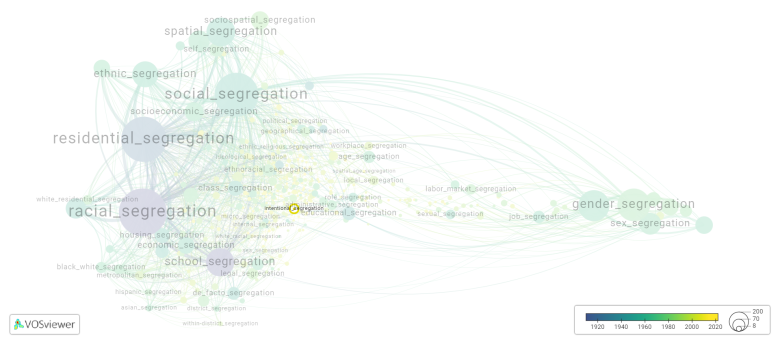Intentional segregation: Difference between revisions
(Creating page) |
(Creating page) |
||
| Line 18: | Line 18: | ||
[[File:intentional_segregation.png|780x780px]] | [[File:intentional_segregation.png|780x780px]] | ||
This visualization is based on the study [[How_to_cite_Segregation_Wiki| The Multidisciplinary Landscape of Segregation Research]]. | |||
For the complete network of | For the complete network of interrelated segregation forms, please refer to: | ||
* | * [https://tinyurl.com/2235lkhw First year of publication] | ||
* | * [https://tinyurl.com/2d8wg5n3 Louvain clusters] | ||
* | * [https://tinyurl.com/223udk5r Betweenness centrality] | ||
* | * [https://tinyurl.com/244d8unz Disciplines in which segregation forms first emerged (Scopus database).] | ||
==References== | ==References== | ||
==Notes== | ==Notes== | ||
Revision as of 07:48, 10 October 2024
Date and country of first publication[1]
2019
United States
Definition
Intentional segregation refers to the deliberate separation of individuals or groups based on certain characteristics, such as race, ethnicity, or socioeconomic status. This separation is often enacted through policies or practices that aim to isolate certain populations from the rest of society.
Historically, intentional segregation has been most commonly associated with racial segregation in the United States. During the period of Jim Crow laws in the late 19th and early 20th century, state and local governments implemented laws that mandated racial segregation in various public institutions, such as schools, transportation, and housing. These policies aimed to maintain white supremacy and deny African Americans equal rights and opportunities.
Other examples of intentional segregation include apartheid in South Africa, where a system of racial segregation was enforced by the government from 1948 to 1994, and the caste system in India, which has long perpetuated social and economic segregation based on birth status.
Although intentional segregation has been largely outlawed in many countries, it can still persist in more subtle forms, such as through housing discrimination, educational disparities, or exclusionary social practices. Efforts to combat intentional segregation focus on promoting diversity, inclusivity, and equal opportunities for all individuals, regardless of their characteristics.
See also
Related segregation forms
Intentional segregation is frequently discussed in the literature with the following segregation forms:
This visualization is based on the study The Multidisciplinary Landscape of Segregation Research.
For the complete network of interrelated segregation forms, please refer to:
References
Notes
- ↑ Date and country of first publication as informed by the Scopus database (December 2023).
At its current state, this definition has been generated by a Large Language Model (LLM) so far without review by an independent researcher or a member of the curating team of segregation experts that keep the Segregation Wiki online. While we strive for accuracy, we cannot guarantee its reliability, completeness and timeliness. Please use this content with caution and verify information as needed. Also, feel free to improve on the definition as you see fit, including the use of references and other informational resources. We value your input in enhancing the quality and accuracy of the definitions of segregation forms collectively offered in the Segregation Wiki ©.
Intentional segregation appears in the following literature
Donato R., Hanson J. (2019). Mexican American resistance to school segregation. Phi Delta Kappan, 100(5), 39-42. SAGE Publications Inc..https://doi.org/10.1177/0031721719827545

